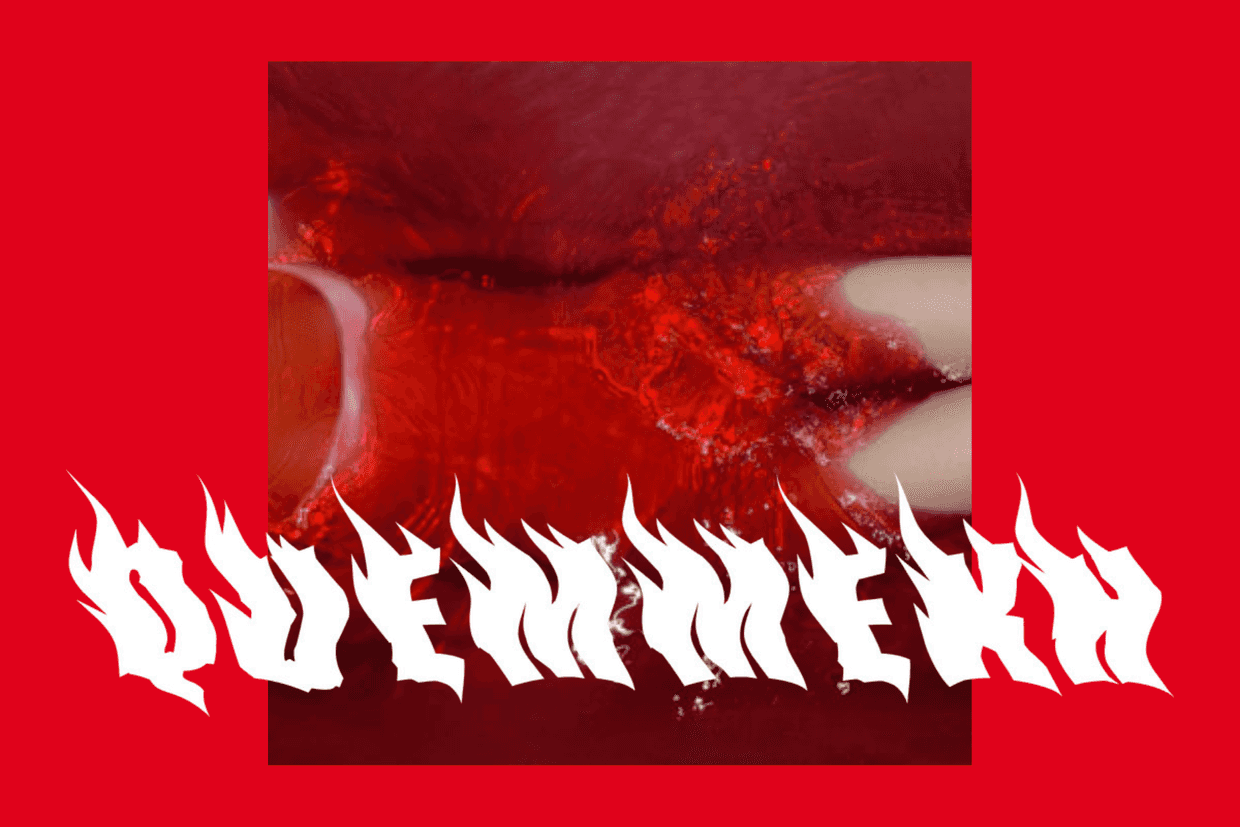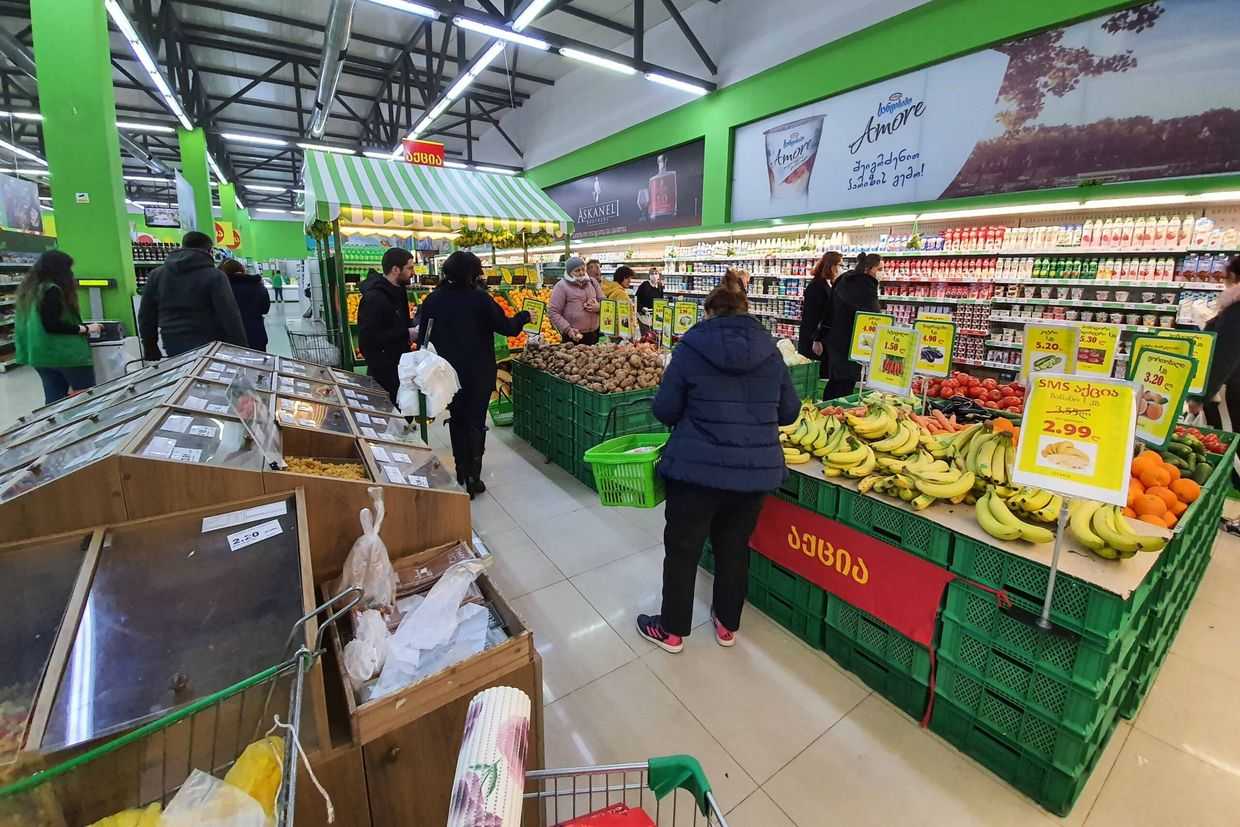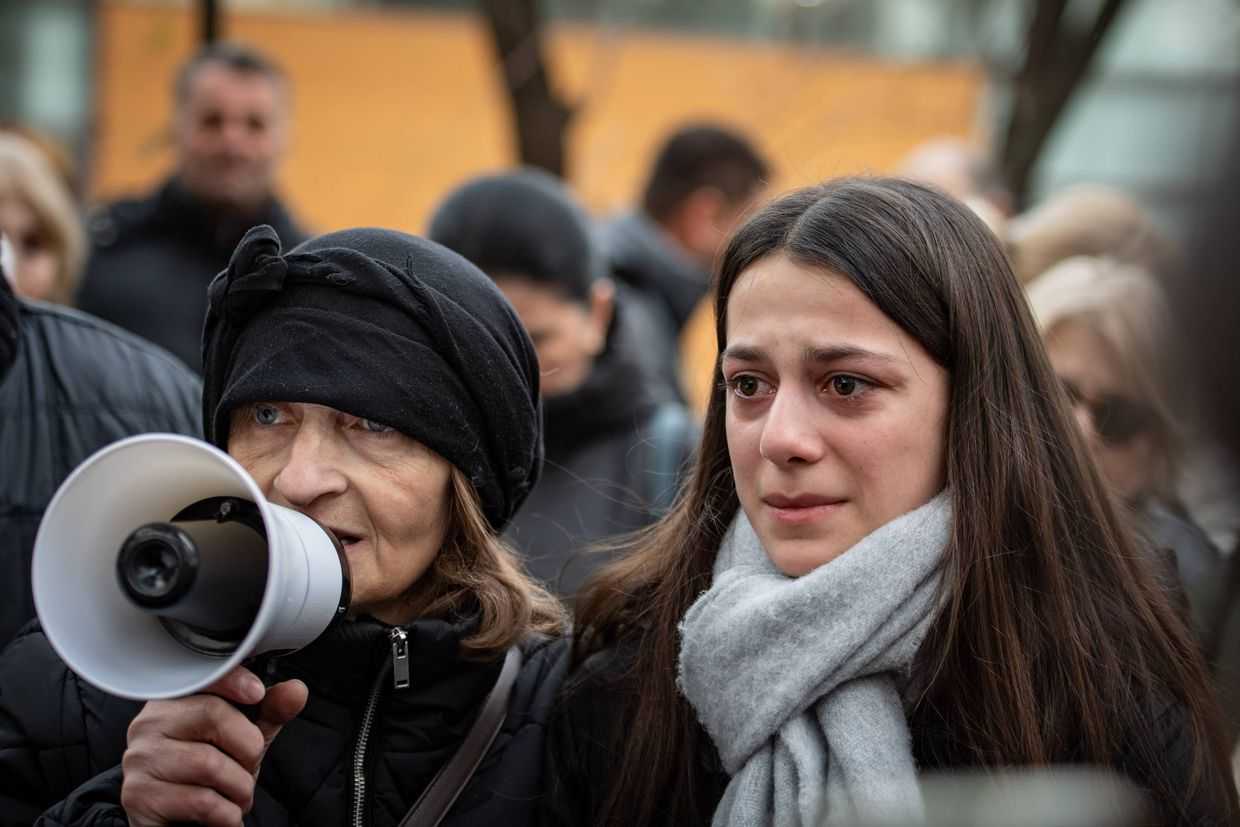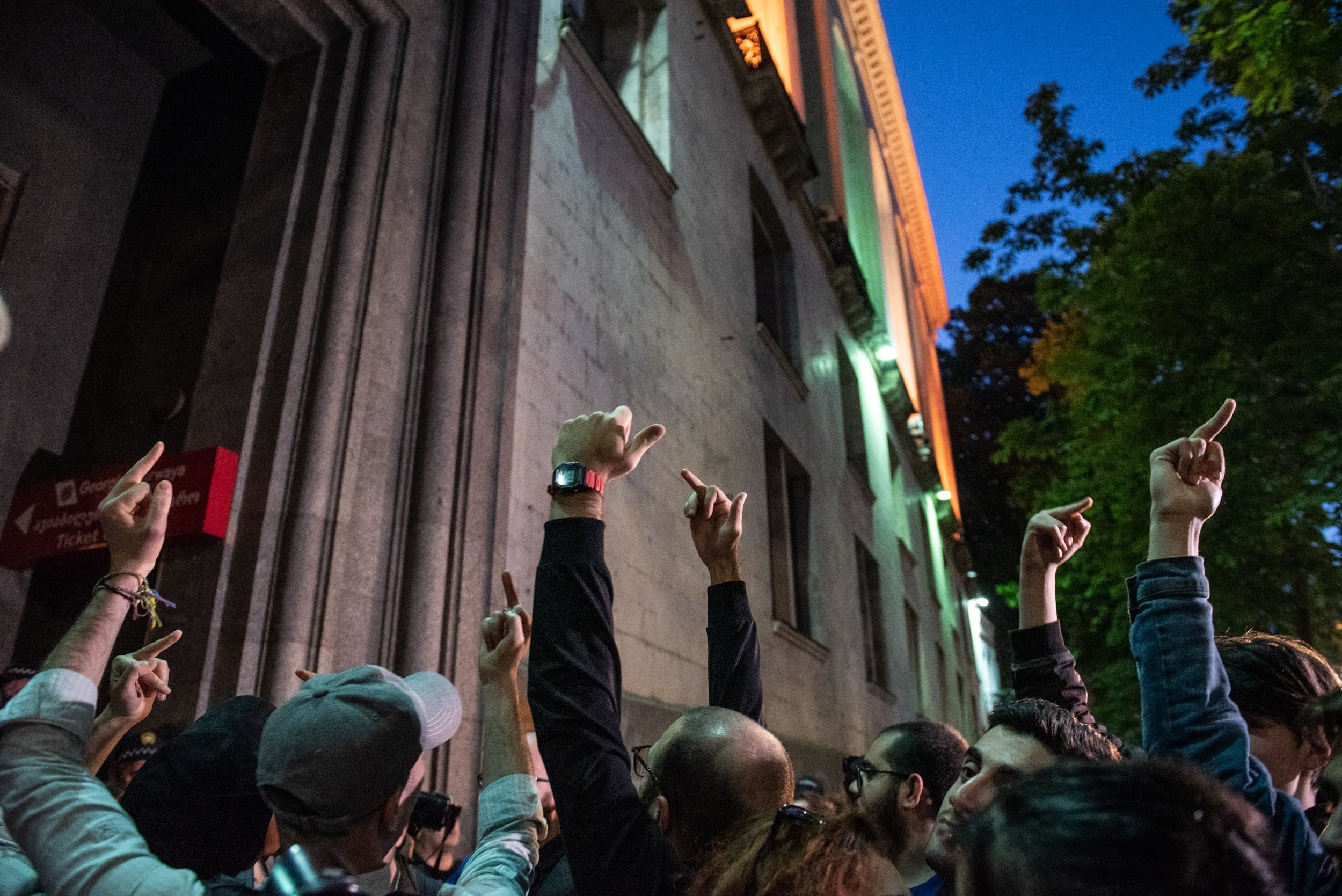
Four protests have taken place in Georgia’s capital this week against plans to restore flight connections with Russia, with those speaking out expressing concerns over Georgia’s prospects of EU integration, and the country growing closer to Russia.
After a first protest outside the parliament on Monday, three protests, attended by thousands in total, were held in Tbilisi on Tuesday, calling on the government to revoke its decision to welcome commercial flights with Russia. The first was organised by the youth wing of the opposition United National Movement, a second ‘performance-protest’ by the European Georgia party, while a third, which attracted the largest number of attendees, was organised by a mix of liberal and opposition groups.
Last week, the Russian government lifted a ban on air travel to Georgia, as well as cancelling visa requirements for Georgian nationals. The first flight from Russia is scheduled to arrive on Friday.
[Read more on OC Media: Russia lifts travel restrictions for Georgians]
On Tuesday, EU Foreign and Security Affairs spokesperson Peter Sano stated that the Georgian government’s readiness to resume direct flights with Russia was ‘very regrettable’. The previous week, US State Department spokesperson Vedant Patel had warned that companies at Georgian airports could be at risk of sanctions ‘if they service aircraft subject to import and export control’.
One of the rallies moved from outside the parliament building to the office of Georgian Airways. The company confirmed on Tuesday that they would begin operating direct Tbilisi–Moscow flights seven times a week from 20 May.
“Putin Khuylo”, “Bidzina Khyulo”, “fuck Russia”, protesters are still outside the Georgian Airways office protesting direct flights with Russia. pic.twitter.com/NaZiRMaTvk
— Mariam Nikuradze (@mari_nikuradze) May 16, 2023
The company responded with a heated statement on Tuesday night, published ‘in the name of the staff’ shortly after the crowds dispersed from outside their office. The statement called protesters ‘bandits’ and ‘ridiculous nothings’, and demanded that they ‘keep [their] dirty hands off Georgian Airways’.
‘Double standards’
A day after the protests, Georgian Airways CEO Tamaz Gaiashvili complained about ‘double standards’ being applied to ‘small Georgia and its small air company’, while Turkey, Israel, Arab states, Armenia, and Azerbaijan were allowed to have air connections with Russia while remaining ‘strategic partners of the USA and the EU’.
Gaiashvili also claimed that the protests in Tbilisi were an attempt to smear the Georgian government.
The ruling party has pursued similar narratives.
On Tuesday night, chair of the ruling Georgian Dream party, Irakli Kobakhidze, complained that Georgia was being treated unfairly compared to Moldova, which he said had a ‘cautious [foreign] policy but […] everyone met it with understanding’.
Unlike Georgia, Moldova secured EU membership candidacy last June together with Ukraine, prompting concerns that Georgia was falling behind them in its bid for EU membership.
‘They understand Moldova’s caution and pragmatism but don’t tolerate if we do half of that. […] There is only one reason [for this]: this is a global party of war that expects an entirely different thing from Georgia’, Kobakhidze insisted in a Tuesday interview with the Georgian Public Broadcaster.
For the past year, the Georgian government has touted a conspiracy theory of a ‘global party of war’ that is supposedly seeking to push Georgia into ‘opening a second front of war’ with Russia.
In the same interview, the Georgian Dream chair criticised the US for maintaining a strict visa regime and running no direct flights to Georgia, points that have been voiced by government supporters since Russian President Vladimir Putin’s decision on 10 May to lift the air ban.
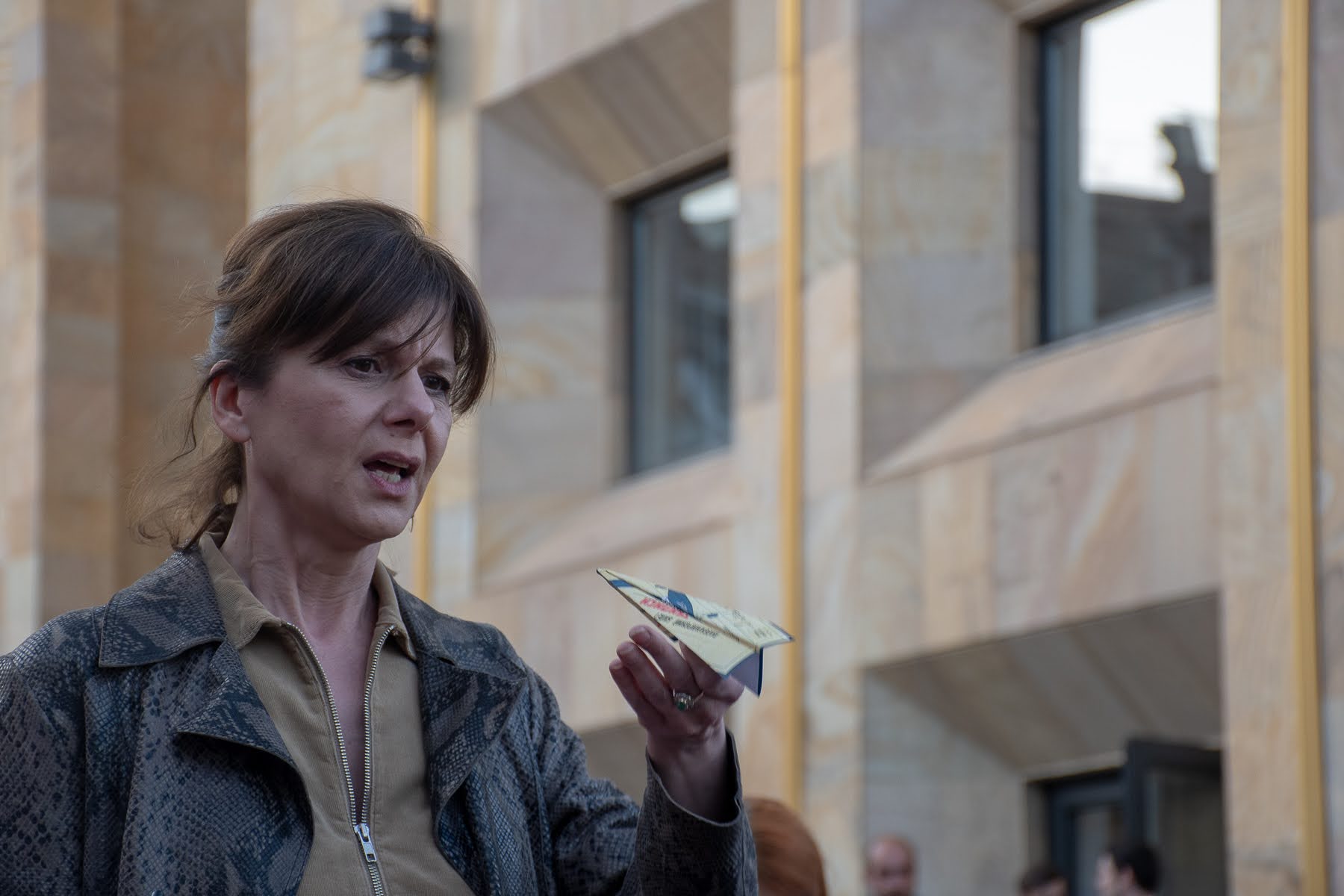
Speaking at a protest performance organised by the European Georgia party on Tuesday, titled ‘One-way ticket to Moscow for Ivanishvili’s regime’, Tamar Chergoleishvili, Director of the Foundation of Civic Education, condemned the ruling party’s rhetoric.
‘They want [to resume flights] to blackmail our Western partners […] Let America also give us visa-free [regime], they say. They want to use this to control damage incurred from their failure on the path of Georgia’s national, historical mission, after they don’t get [EU membership candidate] status’, Chergoleishvili insisted.
The EU is expected to reassess Georgia’s membership candidacy bid later this year, after stating last year that Georgia still had ‘perspective’ to achieve its goal upon undergoing key reforms.
Critics have suggested that Georgia’s government is distancing itself from the EU in favour of closer ties with Russia.
In response to a journalist’s question on Tuesday about the potential of Georgia’s relations with Russia warming, Kobakhidze stated that as long as the ‘margins’ of Georgia’s sovereignty and territorial integrity were observed, it was ‘possible to discuss various issues’ with Russia beyond resuming flights.
‘Unsanctioned’
Following the Kremlin’s announcement, the Georgian government underlined that they would not cooperate with Russian airlines sanctioned internationally, a claim reiterated by Georgia’s Civil Aviation Agency.
The agency did not respond to OC Media’s inquiry about what this would mean in practice.
Shortly after Russia invaded Ukraine, most Western countries closed their airspace to Russian airlines, stopped the lease of aircraft to Russia, and banned the provision of spare parts to Russian aircrafts.
The Russian carrier seeking to operate renewed flights from Russia to Georgia, Rostov-based Azimuth Airlines, uses Superjet aircraft leased from Russian companies rather than foreign aircraft confiscated by the Russian government following the introduction of sanctions, and so has not been blacklisted by the EU.
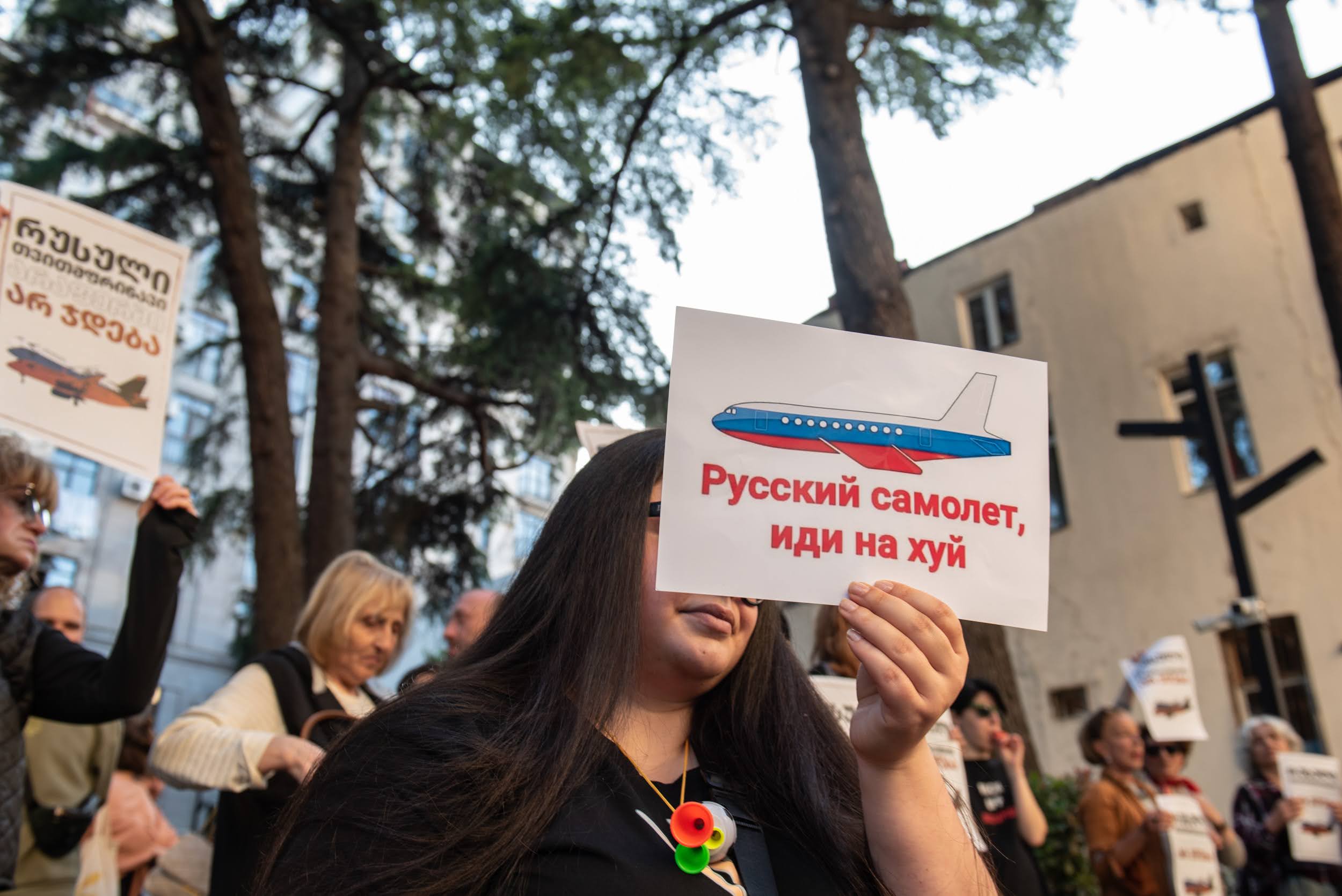
Despite Azimuth Airlines avoiding EU sanctions, their Sukhoi Superjet 100 planes were built by United Aircraft Corporation, a Russian manufacturer sanctioned by the EU in mid-March 2022 for producing fighter aircraft used in Russia’s invasion of Ukraine.
‘United Aircraft Corporation is responsible for supporting, materially or financially, actions which undermine or threaten the territorial integrity, sovereignty and independence of Ukraine’, the Council of the European Union stated last year.
Less than a month later, the EU also personally sanctioned Yuri Slyusar, president of United Aircraft Corporation, as ‘one of the leading actors in the Russian industry and defence sector’, with ‘close ties’ to the Russian government.
Two further protests are planned for Friday: one to meet the first Azimuth flight to Tbilisi at Tbilisi airport, organised by the opposition Droa (It’s Time) party, and another to protest the resumption of air links with Russia outside the parliament.



